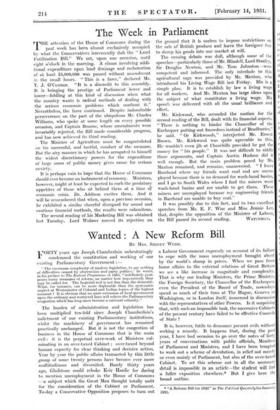The Week in Parliament
THE attention of the House of Commons during the past week has been almost exclusively occupied by what the Conservatives irreverently dub the " Land Futilization Bill." We sat, upon one occasion, until eight o'clock in the morning. A clause involving addi- tional expenditure upon land drainage and reclamation of at least £5,000,000 was passed without amendment in the small hours. " This is a farce," declared Mr. T. J. O'Connor. "It is a discredit to this assembly. It is bringing the prestige of Parliament lower and lower—fiddling at this kind of discussion when what the country wants is radical methods of dealing with the serious economic problems which confront it." Nevertheless, the farce continued. Despite indomitable perseverence on the part of the ubiquitous Mr. Charles Williams, who spoke at some length on every possible occasion, and Captain Bourne, whose amendments were invariably rejected, the Bill made considerable progress, and has now achieved its third reading.
The Minister of Agriculture must be congratulated on his successful, and tactful, conduct of the measure. But the airy manner in which he has arrogated to himself the widest discretionary powers for the expenditure of large sums of public money gives cause for serious anxiety.
It is perhaps vain to hope that the House of Commons should ever become an instrument of economy. Ministers, however, might at least be expected to curb the predatory appetites of those who sit behind them at a time Of economic crisis. Dr. Addison excites them. And it will be remembered that when, upon a previous occasion, he exhibited a similar cheerful disregard for sound and cautious financial methods, the results were calamitous.
The second reading of his Marketing Bill was obtained last Tuesday. Lord Wolmer moved its rejection on the ground that it is useless to impose restrictions on the sale of British produce and leave the foreigner free to dump his goods into our market at will.
The ensuing debate was dull, although some of the speeches—particularly those of Mr. Blindell, Lord Stanley, Sir Douglas Newton, and Mr. Tom Johnston—were competent and informed. The only interlude to this agricultural saga was provided by Mr. Maxton, who introduced his Living Wage Bill last Friday. His is a simple plan. It is to establish by law a living wage for all workers. And Mr. Maxton has large ideas upon the subject of what constitutes a living wage. His speech was delivered with all the usual brilliance and effect.
Mr. Kirkwood, who seconded the motion for the second reading of the Bill, dealt with its financial aspects. " There is nothing to hinder the Chancellor of the Exchequer putting out Snowdens instead of Bradburies,'! he said. " Or Kirkwoods," interjected Mr. Ernest Brown. Mr. Kirkwood was quite agreeable to this. He wouldn't even jib at Churchills provided he got the money for " his people." It was not difficult to riddle these arguments, and Captain Austin Hudson did it well enough. But the main problem posed by Mr. Maxton remained, and remains, unanswered. " I leave Barrhead where my friends want- coal and are unem- ployed because there is no demand for wash-hand basins, and I go to South Wales where I find the miners want wash-hand basins and are unable to get them. These miners are unemployed because my engineering friends in Barrhead are unable to buy coal."
It was possibly due to this fact, and to two excellent speeches from Mr. E. F. Wise and Miss Jennie Lee, that, despite the opposition of the Minister of Labour, the Bill passed its second reading. WATCHMAN.















































 Previous page
Previous page